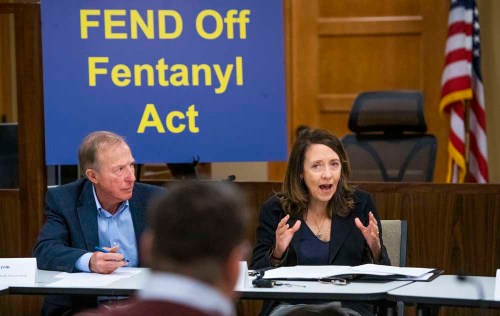Sen. Maria Cantwell discusses fentanyl crisis response at Walla Walla roundtable
Published 8:00 am Friday, August 25, 2023

- U.S. Sen. Maria Cantwell, right, addresses the room Thursday, Aug. 24, 2023, during a roundtable in Walla Walla on the fentanyl crisis.
WALLA WALLA — Walla Walla health officials and law enforcement took the opportunity Thursday, Aug. 24, to tell U.S. Sen. Maria Cantwell about the lack of resources in the county to fight the fentanyl crisis.
Cantwell made the eighth stop on her “fentanyl listening tour” Aug. 24 at the Walla Walla County Department of Community Health. She hosted a roundtable with nine local individuals who are working on the front lines of the fentanyl crisis, including first responders and recovery program leaders.
Trending
“We’ve had a lot of discussions with some big communities but felt it was important to have the discussion with some communities that may not have all the resources they need,” Cantwell said.
The overarching issue addressed at the roundtable was Walla Walla’s lack of resources to help local people struggling with addiction and other problems that tend to come along with it, such as housing and mental health.
Everett Maroon, executive director of Blue Mountain Heart to Heart, said not only is their more fentanyl across the county, but its potency is also increasing. Maroon’s organization provides drug checking, which allows it to legally test the potency of a user’s drug before they take it. He said previously it was common to see drugs that contained only 5% fentanyl but now health care workers are seeing drugs that contain 60-70% fentanyl.
Blue Mountain Heart to Heart also administers Naloxone, which can reverse a drug overdose. Law enforcement officers administer the drug as well. However, Maroon said he wants to do more than just prevent death with Naloxone.
“It’s great to do prevention — I’m all for prevention, I’m all for law enforcement getting some of these things out of our communities,” Maroon said. “But for the people that already are addicted, I’d love to see some supported housing and services provided there.”
Walla Walla does not have any residential treatment facilities, with the nearest facility located in Spokane.
Trending
Walla Walla Police Capt. Eric Knudson added the police department’s drug task force is facing funding issues because it operates with funds received from the Edward Byrne Memorial Justice Assistance Grant Program.
“We receive about $235,000 annually from the Byrne JAG Grant,” Knudson said. “Again, we’re going to be competing for that.”
The task force’s grant was extended until July 2024 and has been used to pay for partnering with the city of College Place, the county of Walla Walla and the county’s Department of Corrections.
“Without that funding, we may not have those partners in the future,” Knudson said.
He said the task force would need some kind of ongoing funding to operate efficiently.
Meanwhile, Cody Maine, a community paramedic with the Walla Walla Fire Department, proposed a mobile medication injection program.
“Mobile services, I think, is a huge place where we can go meet people where they are,” Maine said. “Brick-and-mortar places are hard for a lot of people to get to.”
He said it would be helpful for health care workers to be able to meet users anywhere they are and inject them with medication rather than giving them a bottle of pills.
“You can have somebody who’s schizophrenic, and they need a bottle of pills,” Maine said. “If you say, ‘Remember to take these three times a day,’ the person’s delusional and they’re going to lose them quickly. They’re definitely not going to remember to take them throughout the day. They live in homelessness where either they lose them or they’re stolen.”
He said administering the drugs in injectable form would prevent those issues and keep the medication in the person’s system.
Cantwell’s listening tour, which started in May, continued Aug. 25, with another roundtable discussion in Yakima.
Cantwell cosponsored the FEND Off Fentanyl Act, which was passed by the U.S. Senate last month and would declare international trafficking of fentanyl a national emergency and allow government agencies to more effectively penalize fentanyl traffickers.
“We definitely are doing everything we can to try to give better tools to local law enforcement to work collaboratively with the feds to try and stop the flow of this product,” Cantwell said. “But we also want to attack fentanyl in our local communities.”









